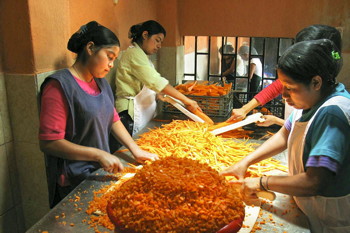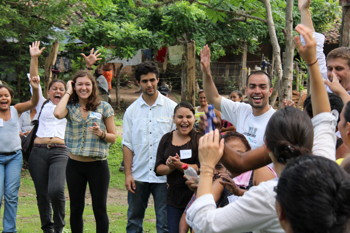COVER STORY
Action Teens, apples and the spirit of democracy: Cornell's culture of public engagement expands the definition of 'land grant'
Page 4 of 9
Yearning to get back to that kind of experience, she left the biotech firm and returned to school for a degree in human nutrition. "It was one of the great ideas of my life, really," she says. She graduated from Cornell with a master's degree in 1988 and a Ph.D. in 1992.

CARE International began working with the Cornell Ecoagriculture Working Group to conduct a Global Agricultural Review in 2010. Above, the Guatemala Highland Value Chain Development Alliance, an example of CARE's ongoing agricultural and natural resources strategy with women, provides technical support and market access to farmers to alleviate rural poverty. Photo provided by CARE. See larger image
In her role as provost's fellow, Stoltzfus is at the center of discussions about what part public engagement does and should play in the university's work.
For Stoltzfus, public engagement connects to Cornell's land-grant mission in four ways: finding solutions to problems, asking the right questions in the first place, deepening the educational experience for students and "preparing ourselves and our students to be engaged in democracy, which requires the ability to have conversations with the diverse members of our society and understand where they are coming from.
"This whole notion of public engagement," Stoltzfus contends, "is as much about rigor as it is about charity. It's not just about doing good; it's about being really good at what we do. There are a lot of questions you won't think to ask just sitting at your desk in your office. Part of the knowledge we need can only be obtained by being out in the world."

Cornell students from the Sustainable Neighborhood Nicaragua (SNN) team participate in group activity with San Diego, Nicaragua, residents. See larger image
After spending most of her professional life studying what foods and nutrients young children should be fed, Stoltzfus had an epiphany: "I more and more realized that a big bottleneck was not the lack of knowledge or lack of food, but the lives of women who are the primary feeders and caregivers of children. I could have the perfect food, the perfect message, but if there are not enough hours in her day, if she's being beaten up by her husband, if she's actually clinically depressed, I could talk 'til the cows come home about what food she should feed her baby."
It's a lesson she passes on to her students, not just by telling them, but also by giving them opportunities to engage with communities themselves. "I teach about food insecurity in developing nations, but it's really important for me that my students don't see that as an issue that is out there, outside our walls, outside our neighborhoods," she says, "but [that they] realize that everything we talk about in terms of global problems does exist in our own neighborhood. It's important educationally to realize that and to realize that as citizens."
<<View entire story as one page>>
